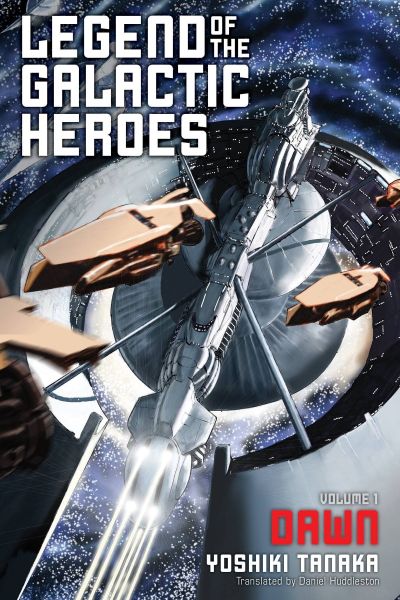It’s a Shame We’re All Dying
Dawn (Legend of the Galactic Heroes, volume 1)
By Yoshiki Tanaka (Translated by Daniel Huddleston)

29 Mar, 2017
0 comments
1982’s Dawn is the first volume in Yoshiki Tanaka’s ten-volume Legend of the Galactic Heroes, a series of space-opera novels . It was translated into English by Daniel Huddleston.
The Milky Way is divided between two great powers. On one side, the autocratic Galactic Empire, with twenty-five billion subjects. On the other, the democratic Free Planets Alliance, with thirteen billion citizens. The Empire refuses to admit the right of people to live outside the Empire and has sought to conquer the Free Planets ever since they discovered the existence of the Alliance. The Free Planets, founded by escaped serfs, are determined to remain free. The balance of power is such that neither side has been able to win a decisive victory. The war has lasted over a century.
Two military geniuses enter the arena.
Reinhard von Lohengramm’s rivals believe that his rise through the Empire’s ranks is thanks to his personal connection to the Kaiser. Reinhard’s sister Annarose is Kaiser Friedrich IV’s concubine. She is not a willing concubine; Reinhard’s (undeclared, at least to the Kaiser) primary goal in joining the armed forces is to gather enough power to overthrow the corrupt Goldenbaum Dynasty and free Annarose.
And of course, unify the entire galaxy under the firm but wise rule of a rejuvenated Empire. But that really goes without saying.
Yang Wen-li’s military career, in contrast, was almost an accident. All Wen-li wants to do is drink tea and study history. Alas, the endless war has drawn funds away from all non-martial pursuits. Since military academy was the only school available, Wen-li went to a military college. His fatal miscalculation was to assume that he would be allowed to focus on academic pursuits. The would-be scholar soon found himself serving on an Alliance ship.
The two strategists first meet near the planet Astarte, where Wen-li spoils what should have been a decisive victory for Reinhard. Reinhard’s unconventional tactics allow him to smash two Alliance fleets despite being outnumbered. Wen-li’s cunning saves the remaining Alliance ships and prevents any Imperial occupation of Astarte.
Reinhard respects his rival, which only means he is that much more determined to prove himself by crushing Wen-li.
This sets the pattern for the two officers’ careers: Reinhard, determined to climb the greasy pole of Imperial command, eagerly seeks out opportunities to demonstrate his genius, while diffident Wen-li finds himself compelled by self-serving superiors to venture out into battlefields when he would rather remain quietly in his study. Reinhard can out-think every Alliance officer save Wen-li, but of course it is Wen-li against whom Reinhard finds himself contending again and again.
~oOo~
This novel lives at the intersection of space opera and milSF, two sub-genres both of which are comfortable with blatant info-dumping. This may explain why we have to read twelve pages of dry text about galactic history before we get to the actual story. The advantage of such a prologue is that the reader heads into the story proper knowing how the galaxy ended up in its deplorable condition. The disadvantage is many readers may stall a few pages short of the story’s start. The good news is that if the reader survives the initial info-dump, they can expect a thrilling tale.
Caveats: I’m a pretty tone deaf tolerant reader, for which I credit decades of reading older SF, not exactly known for its dazzling prose style. Still, I noticed the prose in this translation does not exactly sing, even if I take into account the difficulties of translation. I also noticed that the novel does not so much as conclude as end abruptly. Well, perhaps one should expect as much from a ten-volume series.
Readers should also be aware that this is in no sense hard SF. Tanaka draws on historical models for his battles. As there is as yet no history featuring epic space battles and galactic empires, the author must extrapolate from the planet-bound past. If the various clashes feel like they are Prussia-vs-the-rest-of-the world IN SPAAACE, that is because they are.
And yet.…
What makes the book work are the two central characters. On one side, a driven officer determined to reform his society, while being so blinkered by his upbringing that he cannot really imagine what fundamental reforms would look like. On the other side, a brilliant but lazy intellectual whose success is enabled (in large part) because he declines to become invested in national and martial patriotism; seeing current events with a historian’s dispassion, he can reject conventional solutions [1] for ones that actually work. The two men don’t even define victory in the same way.
It’s too bad for millions of crew-members on both sides that the two men occupy the galactic stage at the same time. Either one in isolation could probably bring the long conflict to an abrupt end. Instead, legions die as the two parry and riposte their way across the stars, so closely matched in ability as to make swift victory impossible. Hard luck for officers and the enlisted, but good news for readers, because there are nine more volumes in the series.
Dawn is available here (Amazon) and here (Chapters-Indigo).
1: Early on, there’s a battle in which the Alliance tries to use the same tactics that won a major battle lifetimes ago. The idea that the Empire might remember the loss and refuse to play the game the exact same way a second time doesn’t seem to occur to most of the Alliance officers, because that would mean the coming battle was not an assured win for the Alliance.
